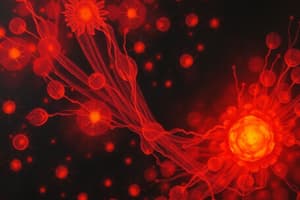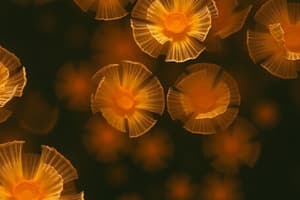Podcast
Questions and Answers
What is one of the primary requirements for T-cell activation by antigen-presenting cells (APCs)?
What is one of the primary requirements for T-cell activation by antigen-presenting cells (APCs)?
- High levels of cytokines present in the environment
- Direct recognition of free antigens by T cells
- Costimulatory signal involving CD28 and CD80 (correct)
- Inhibition of CD3 zeta chain phosphorylation
Which of the following outcomes can occur when T cells are properly activated?
Which of the following outcomes can occur when T cells are properly activated?
- Anergic state observable immediately
- Diminished production of cytokines
- Proliferation of T cells (correct)
- Secretion of IgG without any T cell help
What characterizes T-independent antigens in B cell activation?
What characterizes T-independent antigens in B cell activation?
- They require T cell help for effective activation
- They primarily provoke IgM responses and little immunologic memory (correct)
- They only induce IgG responses and long-term memory
- They are always stronger than T-dependent antigens
What role does super antigen play in immune response?
What role does super antigen play in immune response?
What happens to a T cell if it does not receive a complete set of activation signals?
What happens to a T cell if it does not receive a complete set of activation signals?
Which marker is exclusively found on B cells?
Which marker is exclusively found on B cells?
What is the role of the thymus in T cell maturation?
What is the role of the thymus in T cell maturation?
What percentage of T cell precursors typically survive the selection process in the thymus?
What percentage of T cell precursors typically survive the selection process in the thymus?
What type of T lymphocyte is characterized by CD4+ markers?
What type of T lymphocyte is characterized by CD4+ markers?
Which CD marker is associated with cytotoxic T cells?
Which CD marker is associated with cytotoxic T cells?
What results from the activation of naïve T cells in secondary lymphoid organs?
What results from the activation of naïve T cells in secondary lymphoid organs?
What type of T cells are primarily responsible for the regulation of antibody production?
What type of T cells are primarily responsible for the regulation of antibody production?
What molecule on antigen-presenting cells (APCs) do T cells recognize foreign antigens through?
What molecule on antigen-presenting cells (APCs) do T cells recognize foreign antigens through?
What method is considered the gold standard for diagnosing immune system function related to lymphocyte activity?
What method is considered the gold standard for diagnosing immune system function related to lymphocyte activity?
Which of the following describes a defect associated with T-cell activation?
Which of the following describes a defect associated with T-cell activation?
In the context of lymphocyte activation, which antigen is commonly used to stimulate T cells?
In the context of lymphocyte activation, which antigen is commonly used to stimulate T cells?
What common condition is associated with a pretranslational defect in interleukin-2 (IL-2) production?
What common condition is associated with a pretranslational defect in interleukin-2 (IL-2) production?
Which cytokine is notably involved in T-cell signal transduction that may be defective in immunodeficiencies?
Which cytokine is notably involved in T-cell signal transduction that may be defective in immunodeficiencies?
Which mechanism is NOT involved in the killing of target cells by cytotoxic T cells (Tc)?
Which mechanism is NOT involved in the killing of target cells by cytotoxic T cells (Tc)?
What role does granzyme play in the apoptosis process initiated by Tc cells?
What role does granzyme play in the apoptosis process initiated by Tc cells?
Which cytokine is involved in binding to TNF receptors to induce apoptosis?
Which cytokine is involved in binding to TNF receptors to induce apoptosis?
Which T cell type is characterized by its inability to directly kill infected cells?
Which T cell type is characterized by its inability to directly kill infected cells?
The primary function of CD8+ cytotoxic T cells (Tc) includes which of the following?
The primary function of CD8+ cytotoxic T cells (Tc) includes which of the following?
What does CAD stand for in the context of apoptosis?
What does CAD stand for in the context of apoptosis?
What is a key function of T-helper type 1 (Th1) cells?
What is a key function of T-helper type 1 (Th1) cells?
Which protein is primarily found in the vesicles of NK cells?
Which protein is primarily found in the vesicles of NK cells?
What is the primary function of plasma cells in the immune response?
What is the primary function of plasma cells in the immune response?
Which type of B cell is characterized by having a CD5 marker?
Which type of B cell is characterized by having a CD5 marker?
What type of activation involves B cells binding to an antigen and receiving a secondary activation signal through TLR?
What type of activation involves B cells binding to an antigen and receiving a secondary activation signal through TLR?
Where does B-cell maturation primarily occur?
Where does B-cell maturation primarily occur?
What is a characteristic of T-cell independent activation of B cells?
What is a characteristic of T-cell independent activation of B cells?
Which of the following is NOT a condition that can lead to an increase in plasma cells?
Which of the following is NOT a condition that can lead to an increase in plasma cells?
What are naive lymphocytes?
What are naive lymphocytes?
Which type of immune cell accounts for the majority of B lymphocytes in adults?
Which type of immune cell accounts for the majority of B lymphocytes in adults?
Study Notes
Cell Classification
- B cells are distinguished by the B-cell receptor (BCR), which is a surface immunoglobulin.
- T cells are distinguished by the T-cell receptor (TCR).
- Helper T cells (Th) are characterized by the presence of CD4.
- Cytotoxic T cells (Tc) are characterized by the presence of CD8.
- Both Tc and Th cells express CD3, which is part of the TCR complex.
Lymphocyte Maturation
- T cells originate in the bone marrow and mature in the thymus.
- T cells undergo random recombination of TCR genes during maturation in the thymus.
- Mature T cells with receptors that recognize self-antigens undergo apoptosis.
T-cell Maturation in the Thymus
- Immature T cells undergo positive and negative selection in the thymus.
- Only a small percentage (2-3%) of T-cell precursors survive these selection processes.
- Mature T cells are either CD4+ or CD8+.
T-cell Activation
- Mature, naive T cells circulate in the peripheral blood until they encounter foreign antigens presented on MHC molecules of antigen-presenting cells (APCs).
- This encounter leads to T-cell activation, proliferation, and differentiation into effector and memory cells.
T-Lymphocyte Subsets
- Helper T (Th, CD4+) lymphocytes produce various cytokines.
- Th1 cells promote cell-mediated immunity, activating Tc, NK cells, and macrophages.
- Th2 cells regulate antibody production by B cells.
General Functions of CD8+ Cytotoxic T cells
- CD8+ Tc cells are cytotoxic and destroy infected cells.
- Tc cells are important in the immune response to viruses, intracellular bacteria, and tumors.
Mechanisms of Target Cell Killing by NK or Tc Cells
- NK and Tc cells release cytotoxic vesicles containing perforins, granzymes, and TNF.
- Perforins create pores in target cell membranes, allowing granzymes to enter.
- Granzymes activate caspases, which trigger apoptosis.
- TNF binds to TNFR and activates apoptosis.
- Granulysin is an antimicrobial compound found in NK vesicles.
- FasL on Tc cells binds to Fas on target cells, also activating apoptosis.
General Functions of CD4+ T-helper Cells
- Th cells promote the activation and direction of other immune cells.
- Th1 cells activate cell-mediated immunity.
- Th2 cells promote antibody-mediated immunity.
Antigen Recognition by T Cells
- T cells recognize antigens only when presented by self-MHC molecules.
T-cell Activation by APCs
- T-cell activation requires three signals:
- Binding of CD4 or CD8 to MHC class II or MHC-I, respectively.
- Phosphorylation of CD3 zeta chain and specific kinases.
- Costimulatory signal, such as the interaction between CD28 on T cells and CD80 on APCs.
- T-cell activation leads to proliferation, cytokine secretion, and differentiation into effector and memory cells.
- T-cell anergy occurs when a cell doesn't receive a full set of signals.
B Lymphocyte Activation and Maturation
- B cells mature in the bone marrow and gut-associated lymphoid tissue (GALT).
- B-cell activation leads to enlargement, development of synthetic machinery, division, maturation, and antibody secretion.
- B cells can activate independently from T cells, for example, through stimulation by LPS.
Types of B- Cell Activation
- T-cell dependent activation: requires interaction with Th cells.
- T-cell independent activation: can occur through stimulation by mitogens or some antigens.
Plasma Cell Biology
- Plasma cells are the end stage of B-cell differentiation, specializing in antibody production.
- Plasma cells can be found in high numbers in infections, autoimmune diseases, and malignant disorders like multiple myeloma.
Other Types of Lymphocytes
- NK cells: Granulated lymphocytes responsible for killing infected cells.
- Memory cells: Long-lived T or B cells that have encountered antigen.
- Virgin or naive lymphocytes: Have not encountered their specific antigen.
Immune-Mediated Disease
- Characterized by chronic inflammation and recurrent antibody production.
- Can be caused by dysregulation of the immune system, leading to autoimmune reactions.
Studying That Suits You
Use AI to generate personalized quizzes and flashcards to suit your learning preferences.
Related Documents
Description
This quiz covers the classification and maturation of T-cells, including the roles of CD4 and CD8, as well as their activation processes. Learn about the path T-cells take from the bone marrow to the thymus and the selection processes they undergo. Test your knowledge on immune system functionality and T-cell responses!



